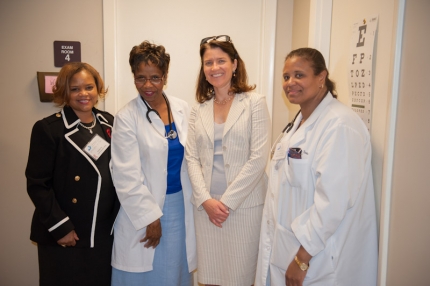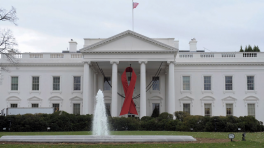Health Care Blog
Affordable Care Act Helps Improve Access to High Quality, Coordinated Care
Posted by on June 20, 2012 at 9:33 AM ESTToday, HHS announced that 219 community health centers received another $128.6 million to help them expand their reach, supporting approximately 5,460 jobs and serve 1.25 million additional patients.
Today’s announcement is one in a series of efforts to make our community health centers stronger. Since the passage of the Affordable Care Act, community health centers around the country have received new resources to expand capacity and improve care for their patients.
At the Erie Family Health Center in Chicago, these new resources are helping staff better monitor patients’ care, follow up with patients and ensure they get the care they need that can stop health problems before they start. For example:
One of the health center’s patients is a 52 year old man with diabetes. At his last appointment, his diabetes numbers were clearly trending in the wrong direction. When he missed his follow-up appointment, the health center knew and was able to reach out to him because of its computer systems reminds the staff to contact patients who have missed appointments or who have lab results showing poorly controlled diabetes.
Learn more about Economy, Health CareLouisa-Care: Making Health Insurance More Affordable for Small Businesses
Posted by on June 20, 2012 at 6:20 AM ESTEd. Note: This was originally published on Healthcare.gov
Louisa McQueeney is general manager and chief financial officer of Palm Beach Groves, a small, family-owned Florida gift and food shipping company. She believes it’s important for a small business to provide health insurance for its employees: “It creates a long-term relationship with your employees,” she says.
Learn more about Economy, Health CareCommunity Health Centers: Expanding Access to Care in Underserved Areas
Posted by on June 19, 2012 at 5:14 PM ESTThe C.W. Williams Community Health Center in Charlotte, North Carolina was created in 1981 when local leaders Peggy Beckwith, founder of the local Sickle Cell Anemia Foundation; Dr. John Murphy, a local dentist; and Rowe "Jack" Motley, the first African-American county Commissioner, filled out an application to create a community health center. Mr. Motley drove to Washington, D.C. to submit their application. Their application was accepted and the C.W. Williams Community Health Center was created.
On May 3, 2012, Alexia Kelley, Director of the U.S. Department of Health and Human Services Center for Faith-Based and Neighborhood Partnerships visited the C.W. Williams Community Health Center. She shared the news that a total of $730 million was being awarded across the country to community health centers, and that C.W. Williams Center had been awarded $500,000 to create a dental clinic. Dentists are in short supply in North Carolina and ranks 47th in dentist-to-population ratio. The new funding will greatly expand access to care.
Learn more about Health CareKiersten-Care: Using the Health Care Tax Credit to Take Care of Employees
Posted by on June 19, 2012 at 3:25 PM ESTEd. Note: This was originally published on Healthcare.gov
Kiersten Firquain founded Bistro Kids in Kansas City, KS, seven years ago to provide locally sourced organic “kid-friendly” food to as many students as possible. While her chefs were cooking up healthy food for youngsters, she wanted to do something for her employees’ health. The health care law tax credit for small businesses, she says, made it possible to offer them health insurance.
“We talked to our chefs and employees and asked, ‘What’s something you would like from Bistro Kids?’ And one of the things that kept coming up was insurance,” Kiersten says.
Bistro Kids qualified for about $1,500 per year in tax credits under the health care law, the Affordable Care Act, which made a huge difference to a small business like hers. For one of her chefs, Kiersten says, health insurance means a $5 co-pay for a prescription instead of a $250 cost, which her chef would not have been able to afford.
Learn more about Economy, Health CareAshley-Care: Health Care Coverage Without Stress for a Young Adult
Posted by on June 19, 2012 at 3:09 PM ESTEd. Note: This is a cross post from Healthcare.gov
Today, 3.1 million people are newly insured thanks to a provision in the law that enables young adults to stay on their parents’ health care plans. Ashley Drew is one of them. Ashley, a young woman from Scarborough, Maine, was born with Cystic Fibrosis, a life-threatening chronic disease. She spends a lot of time in hospitals getting special IV antibiotics, respiratory therapy and physical therapy to clear her lungs and fight infections. One month in the intensive care unit cost her about $144,000; her last stay was for three months.
Ashley was diagnosed with end-stage lung disease and waited on two transplant lists for more than 500 days. She recently successfully underwent a double lung transplant.
Because of the health care law, the Affordable Care Act, young adults under the age of 26 may be able to stay on their parents’ health insurance, and for Ashley, this has made all the difference. Staying on her parents’ insurance allowed her to pursue her education to become a music teacher and to study instrumental conducting – at a pace she could handle with her health condition – and not worry about how to make sure she had coverage.
“The fact that the Affordable Care Act is in effect, it’s amazing, because it’s horrible to have to worry and stress about your health and, in my case, something that everyone takes for granted: breathing,” Ashley says. “Everyone deserves to breathe, but unfortunately without health insurance that’s not a reality for some people.”
Without the security that staying on her parents’ insurance plan provides, Ashley says she would be spending all her time trying to figure out how to come up with the money for her treatment.
Ashley believes the benefits under the law are important for people who don’t have her immediate health concerns as well. “I think the Affordable Care Act brings peace of mind to people all over this country because you don’t know when something’s going to happen,” she says. “Just to know that you have health insurance … You’re not going to lose your car and you’re not going to end up homeless because you got sick.”
If you have a story like Ashley’s, share it at HealthCare.gov/MyCare and join the conversation on Facebook and Twitter.
Learn more about how the Affordable Care Act is helping Young Adults: For more information:
- Abby-Care: Health Coverage for Young Adults Under 26
- StevenCare: Insurance for Young Adults Under Age 26
- Carol-Care and Justin-Care: Extending Coverage on a Parent’s Health Plan
Dori Salcido is the Acting Assistant Secretary for Public Affairs at the U.S. Department of Health and Human Services.
Learn more about Health CareEntrepreneurs and Innovators Rock 3rd Annual Health Datapalooza
Posted by on June 18, 2012 at 2:45 PM ESTImagine a scenario where a patient, from her mobile phone, can find the best possible health care provider and securely book an appointment; where she and her doctor have the latest treatment information at their fingertips; and where this information helps improve or even save her life.
This scenario, and many others like it, is now being brought to life by entrepreneurs and innovators leveraging the power of data to improve health and health care. Last week, we had the amazing experience of joining nearly 1,600 rock-star innovators who packed into the Health Data Consortium’s third annual Health Datapalooza here in Washington.
Using health-related data that are being made accessible in computer-readable form from federal and state agencies, and other sources, entrepreneurs are creating new applications and services that help: consumers find the best health care provider for their families; doctors deliver the best possible care; mayors make better-informed policy decisions; and much more.
Learn more about Health Care, Technology
- &lsaquo previous
- …
- 5
- 6
- 7
- 8
- 9
- 10
- 11
- 12
- 13
- …
- next &rsaquo









